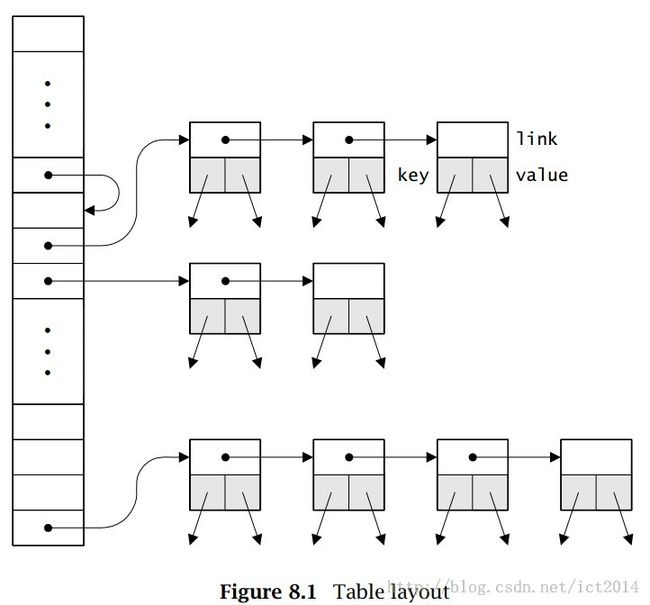C.Interface.And.Implementations—table(key-value系统)的实现
1、An associative table is a set of key-value pairs. It’s like an array except that the indices can be values of any type.
C语言中宏的作用域是文件或者遇到undef为止。
table的实现是以哈希表和链表实现。内存形式如下:
===========================table.h===============================
#ifndef TABLE_INCLUDED
#define TABLE_INCLUDED
#define T Table_T
typedef struct T *T;
//exported functions
extern T Table_new(int hint,
int cmp(const void *x, const void *y),
unsigned hash(const void *key));
extern void Table_free(T *table);
extern int Table_length(T table);
extern void *Table_put (T table, const void *key,
void *value);
extern void *Table_get (T table, const void *key);
extern void *Table_remove(T table, const void *key);
extern void Table_map (T table,
void apply(const void *key, void **value, void *cl),
void *cl);
extern void **Table_toArray(T table, void *end);
#undef T
#endif
=========================table.c===============================
#include <limits.h>
#include <stddef.h>
#include "mem.h"
#include "assert.h"
#include "table.h"
#define T Table_T
//types
struct T{
//fields
int size;
int (*cmp)(const void *x, const void *y);
unsigned (*hash)(const void *key);
int length;
unsigned timestamp;
struct binding{
struct binding *link;
const void *key;
void *value;
} **buckets;
};
//static functions
static int cmpatom(const void *x, const void *y){
return x != y;
}
static unsigned hashatom(const void *key){
return (unsigned long)key>>2;
}
//functions
T Table_new(int hint,
int cmp(const void *x, const void *y),
unsigned hash(const void *key)){
T table;
int i;
static int primes[] = {509, 509, 1021, 2053, 4093,
8191, 16383, 32771, 65521, INT_MAX };
assert(hint >= 0);
for(i = 1; primes[i] < hint; ++i)
;
table = ALLOC(sizeof(*table) +
primes[i-1]*sizeof(table->buckets[0]));
table->size = primes[i-1];
table->cmp = cmp ? cmp : cmpatom;
table->hash = hash ? hash : hashatom;
table->buckets = (struct binding **)(table + 1);
for(i = 0; i < table->size; ++i)
table->buckets[i] = NULL;
table->length = 0;
table->timestamp = 0;
return table;
}
void *Table_get(T table, const void *key){
int i;
struct binding *p;
assert(table);
assert(key);
i = (*table->hash)(key)%table->size;
for(p = table->buckets[i]; p; p = p->link){
if((*table->cmp)(key,p->key) == 0 )
break;
}
return p ? p->value : NULL;
}
void *Table_put(T table, const void *key, void *value){
int i;
struct binding *p;
void *prev;
assert(table);
assert(key);
//search table for key
i = (*table->hash)(key)%table->size;
for(p = table->buckets[i]; p; p = p->link){
if((*table->cmp)(key,p->key) == 0)
break;
}
if(p == NULL){
NEW(p);
p->key = key;
p->link = table->buckets[i];
table->buckets[i] = p;
table->length++;
prev = NULL;
}else{
prev = p->value;
}
p->value = value;
table->timestamp++;
return prev;
}
int Table_length(T table){
assert(table);
return table->length;
}
void Table_map(T table,
void apply(const void *key, void **value, void *cl),
void *cl){
int i;
unsigned stamp;
struct binding *p;
assert(table);
assert(apply);
stamp = table->timestamp;
for(i = 0; i < table->size; ++i){
for(p = table->buckets[i]; p; p = p->link){
apply(p->key, &p->value, cl);
assert(table->timestamp == stamp);
}
}
}
void *Table_remove(T table, const void *key){
int i;
struct binding **pp;
assert(table);
assert(key);
table->timestamp++;
i = (*table->hash)(key)%table->size;
for(pp = &table->buckets[i]; *pp; pp = &(*pp)->link){
if((*table->cmp)(key, (*pp)->key) == 0){
struct binding *p = *pp;
void *value = p->value;
*pp = p->link;
FREE(p);
table->length--;
return value;
}
}
return NULL;
}
void **Table_toArray(T table, void *end){
int i, j = 0;
void **array;
struct binding *p;
assert(table);
array = ALLOC((2*table->length + 1)*sizeof(*array));
for(i = 0; i < table->size; ++i){
for(p = table->buckets[i]; p; p = p->link){
array[j++] = (void *)p->key;
array[j++] = p->value;
}
}
array[j] = end;
return array;
}
void Table_free(T *table){
assert(table && *table);
if((*table)->length > 0){
int i;
struct binding *p, *q;
for(i = 0; i < (*table)->size; ++i){
for(p = (*table)->buckets[i]; p; p = q){
q = p->link;
FREE(p);
}
}
}
FREE(*table);
}
